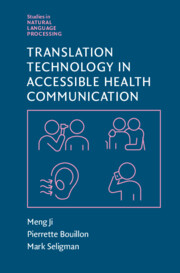Translation Technology in Accessible Health Communication
Digital health translation is an important application of machine translation and multilingual technologies, and there is a growing need for accessibility in digital health translation design for disadvantaged communities. This book aims to address that need by highlighting state-of-the-art research on the design and evaluation of assistive translation tools, along with systems to facilitate cross-cultural and cross-lingual communications in health and medical settings. Using case studies as examples, the principles of designing assistive health communication tools are illustrated. These are (1) detectability of errors to boost user confidence by health professionals; (2) adaptability or customizability for health and medical domains; (3) inclusivity of translation modalities (written, speech, sign language) to serve people with disabilities; and (4) equality of accessibility standards for localized multilingual websites of health contents. This book will appeal to readers from natural language processing, computer science, linguistics, translation and interpreting studies, public health, media, and communication studies.
Meng Ji is an Associate Professor of Translation Studies at The University of Sydney, where she specializes in empirical translation studies and multilingual communications. She received the first PhD in Translation Studies from Imperial College of Science, Technology and Medicine and has worked in London and Tokyo with competitive research fellowships from national research councils in the UK and Japan. The author and editor of more than two dozen books, Dr. Ji has published extensively on environmental and health translation, empirical multilingual translation methodologies, people-centered translation quality assessment, and inclusive translation services and technologies.
Pierrette Bouillon is a professor and dean at the Faculty of Translation and Interpreting, University of Geneva, Switzerland. She is the author of numerous publications in natural language processing, particularly within speech-to-speech machine translation for medical domain and pre- and post-editing, and more recently accessibility. She currently co-leads the Swiss Research Centre Barrier-Free Communication with Zurich University of Applied Sciences, and is the lead investigator of multiple projects of translation studies from the Swiss National Science Foundation and the European Research Council.
Mark Seligman is the founder and President of Spoken Translation, Inc. and the Chief Linguist of Speech Morphing, Inc. Since the 1990s, he has led the design, testing, and implementation of multiple speech translation systems for English, Spanish, Japanese, French, and German, with research associations in the USA, Japan, and Europe, and has contributed to artificial intelligence research and development since the 1980s. He received his PhD in Computational Linguistics from University of California–Berkeley in 1991.

